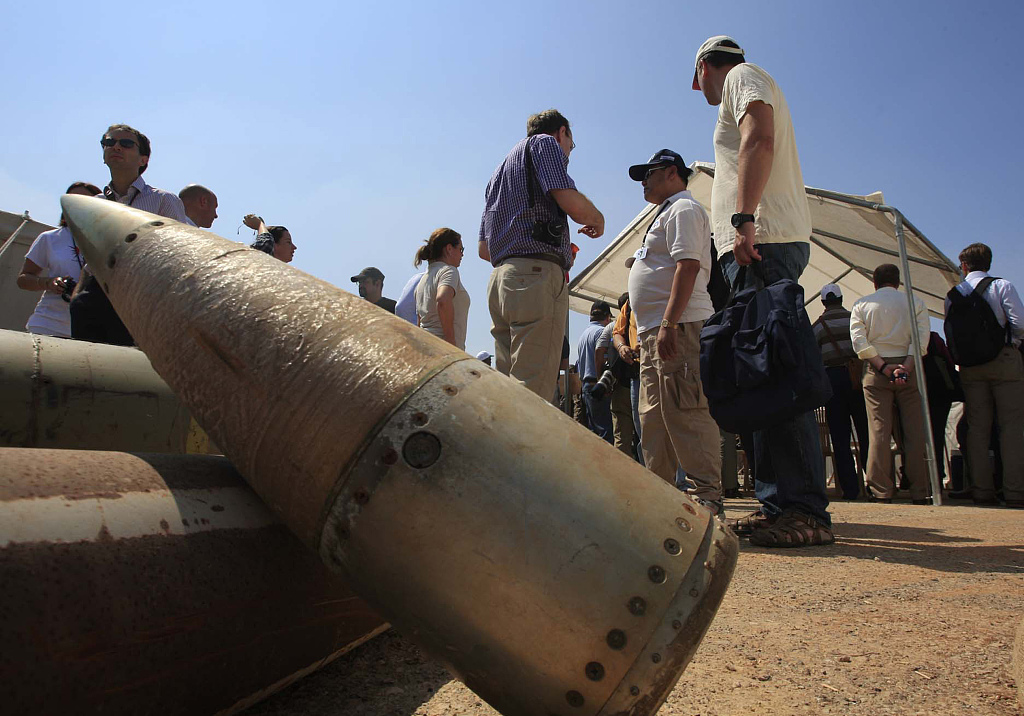
U.S. Under Secretary of Defense for Policy Colin Kahl listens to a question during a briefing at the Pentagon in Washington, D.C., U.S., July 7, 2023. /CFP
U.S. Under Secretary of Defense for Policy Colin Kahl listens to a question during a briefing at the Pentagon in Washington, D.C., U.S., July 7, 2023. /CFP
Editor's note: Mariam Shah, a special commentator for CGTN, is an Islamabad-based independent researcher in the field of conflict studies and military psychology. The article reflects the author's opinions and not necessarily the views of CGTN.
The United States will provide Ukraine with widely banned cluster munitions. Rather than declining the Ukrainian request for the provision of banned cluster munitions, the U.S. is complying with it, knowing the dangers associated with it. Moreover, this decision undermines human rights and international norms, as the impact of these bombs lingers long after the conflict.
If we revisit the history of using banned weapons and cluster munitions, this is not the first time the U.S. has been involved. The United States has, at times, invoked the concept of "military necessity" as a justification for its utilization of prohibited weapons. During the initial stages of the conflicts in Iraq and Afghanistan, cluster munitions were frequently employed in combat, raising international concerns due to the substantial loss of civilian lives they have caused.
From 2003 to 2006 in Iraq, the U.S. and UK forces deployed nearly 13,000 cluster munitions, which included an estimated 1.8 to 2 million submunitions. In Afghanistan, from October 2001 to early 2002, the U.S. military dropped 1,228 cluster bombs, containing a staggering 248,056 bomblets. These actions profoundly affected communities, as cluster munitions pose long-lasting threats to civilian populations even after the conflicts have ceased.
There was uproar in April 2017 when the U.S. military deployed its most formidable non-nuclear bomb, the "Mother of all Bombs" in Afghanistan. The utilization of this immensely powerful fuel-air bomb ignited a contentious debate surrounding the necessity of its use in that specific scenario.
So, what are cluster munitions, and why are they dangerous?
Cluster munitions are either dropped from aircraft or launched from the ground or sea. Once deployed, they disperse numerous submunitions, creating a deadly hail of destruction over a wide area. Anyone close enough to be within reach of these cluster munitions, whether soldiers or innocent civilians, faces an extremely high risk of losing their lives or suffering severe injuries. The indiscriminate nature and long-lasting effects on the civilian population make these munitions extremely unlawful.
These weapons present an immediate and indiscriminate danger to civilians during conflict, as they disperse submunitions or bomblets haphazardly across a wide area. Even after the end of the conflict, these fragments persist as hazardous, functioning as improvised landmines. That is the main reason why more than 100 states including the UK, France and Germany forbid the use of cluster munitions.
Adopted on May 30, 2008, the Convention on Cluster Munitions stands as a crucial international treaty which strictly forbids the utilization, creation, distribution, and accumulation of cluster munitions. However, neither the U.S., Russia, nor Ukraine are signatories to the cluster bomb treaty.

Activists and international delegations stand next to cluster bomb units during a visit to a Lebanese military base at the opening of the Second Meeting of States Parties to the Convention on Cluster Munitions in the southern town of Nabatiyeh, Lebanon, September 12, 2011. /CFP
Activists and international delegations stand next to cluster bomb units during a visit to a Lebanese military base at the opening of the Second Meeting of States Parties to the Convention on Cluster Munitions in the southern town of Nabatiyeh, Lebanon, September 12, 2011. /CFP
The U.S. used the mantra 'military necessity' to rationalize its actions again
"The Ukrainians are running out of ammunition," President Joe Biden told CNN in July. His administration has confirmed the decision to send cluster bombs to Ukraine, and asserted that they are "safer" than the ones currently employed by Russia in the ongoing conflict. So far, the Russian government hasn't admitted that they used cluster bombs in Ukraine.
Sarah Yager, the Washington director at Human Rights Watch, expressed her deep concern, saying that "They are absolutely awful for civilians." She told Al Jazeera in a television interview, "I think when legislators and policymakers here in the United States see the photos coming back of children with missing limbs, parents injured, killed by our own American cluster munitions, there's going to be a real awakening to the humanitarian disaster that this is."
A spokesperson for UN Secretary-General Antonio Guterres reiterated his support for the Convention on Cluster Munitions, emphasizing the need for countries to adhere to its terms and refrain from using cluster munitions in warfare. Moreover, the UK, Germany and Spain, all of which are NATO members and key allies of the U.S., have opposed supplying cluster munitions to Ukraine.
It is so ironic that the country that is "championing" human rights keeps resorting to using prohibited weapons. Despite the international community's consensus on the Convention on Cluster Munitions, which explicitly prohibits their use, production, transfer and stockpiling, the U.S. has employed and supplied such weapons in conflict zones, inflicting suffering on the civilian population.
The justification of "military necessity" is frequently used to support the use of prohibited weapons. However, achieving military goals should never come at the expense of fundamental human rights or be used as a reason to disregard international conventions that aim to safeguard civilians, who are by far the most vulnerable.
(If you want to contribute and have specific expertise, please contact us at opinions@cgtn.com. Follow @thouse_opinions on Twitter to discover the latest commentaries in the CGTN Opinion Section.)